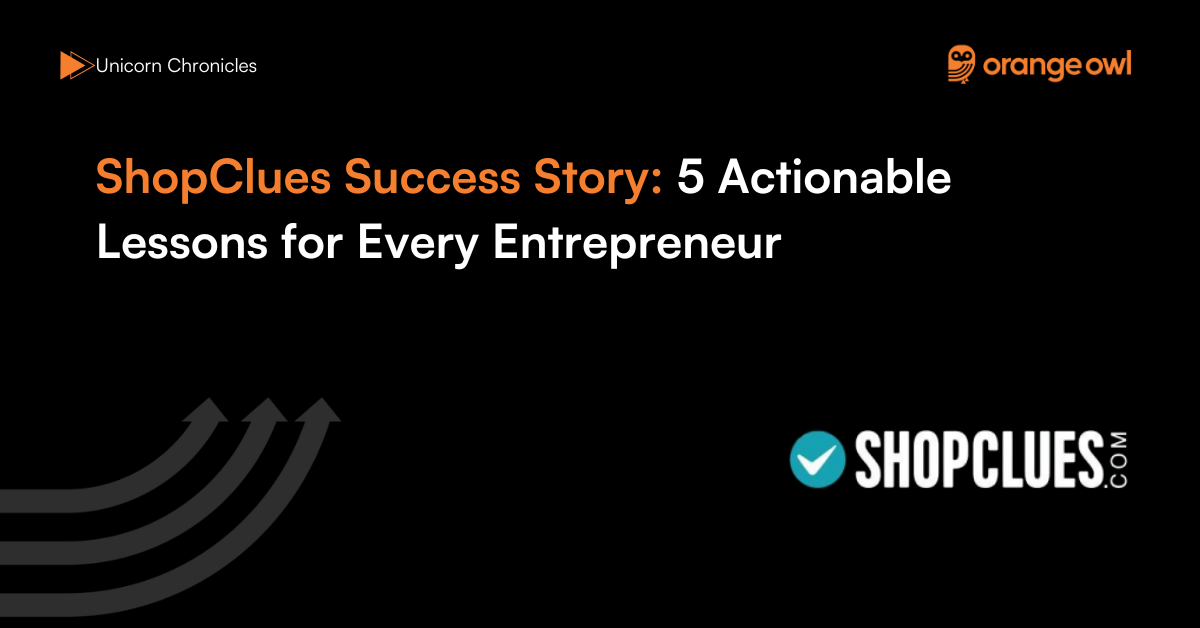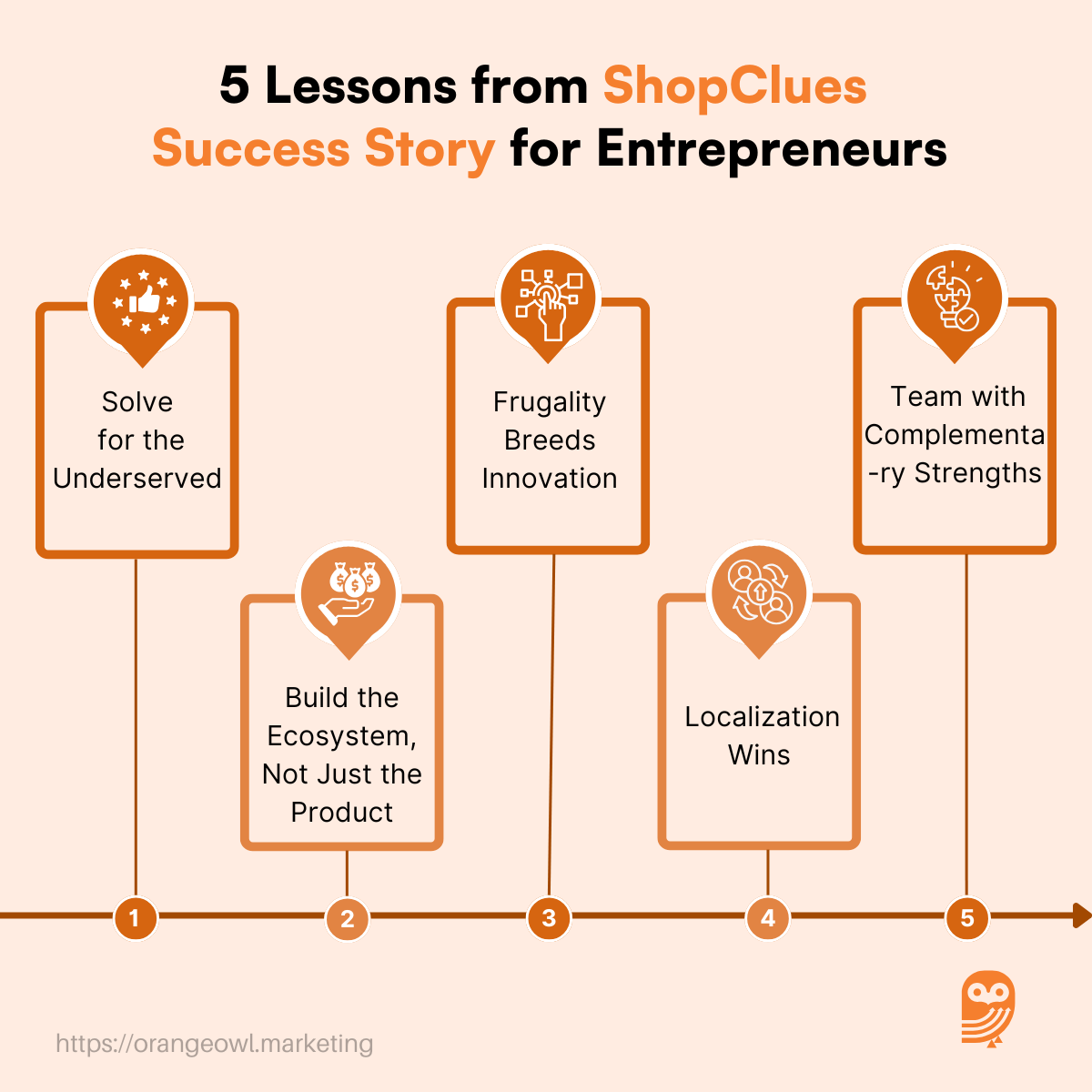ShopClues Success Story: 5 Actionable Lessons for Every Entrepreneur
Vivek Goel
May 23, 2025

Table of Contents
Introduction
Once hailed as one of India’s largest online marketplaces, ShopClues emerged as a disruptor in the Indian e-commerce space by turning its focus toward Tier 2 and Tier 3 cities, long before this segment became a strategic priority for other tech giants. Founded in 2011 by Sandeep Aggarwal, Radhika Aggarwal, and Sanjay Sethi, ShopClues aimed to bridge the digital divide by offering a national selling platform to millions of small and medium-sized merchants who had largely been excluded from the online economy.
Sandeep, a former Wall Street analyst, spotted the opportunity while analyzing the Indian e-commerce market from Silicon Valley. He saw a massive, untapped demand for value-for-money products in non-metro cities. Radhika brought her extensive experience in retail and e-commerce from the U.S., while Sanjay, who had worked at eBay, lent operational expertise to help build a seller-friendly ecosystem.
The impact was quick and notable. Within just a few years, ShopClues claimed a merchant base of over 600,000 sellers, offering over 28 million products, with a customer base spanning 31,500 pin codes across India. By 2016, ShopClues joined the coveted unicorn club with a valuation exceeding $1.1 billion .
Unlike its contemporaries who burned capital chasing top-tier consumers, ShopClues strategically focused on the “real Bharat”—the unbranded, value-seeking customers from smaller towns. This positioning helped the company achieve a Gross Merchandise Value (GMV) of $1.2 billion by 2016 .
Origin Story
The idea for ShopClues was born in Silicon Valley, not in India. Sandeep Aggarwal, a former Wall Street analyst and internet sector expert, noticed something striking during his research in 2010: India was witnessing the early rumblings of an e-commerce boom, yet a massive segment of the population—those in small towns and rural areas—was being ignored. In his own words from an interview, he said,
“India was just starting to talk about e-commerce. I realized nobody was focusing on the real India—the millions of small retailers beyond the metros.”
With a vision to create an inclusive marketplace, Sandeep returned to India and co-founded ShopClues in 2011 with Radhika Aggarwal, his wife and a seasoned brand and marketing professional from the U.S., and Sanjay Sethi, an operations expert who had spent years working with eBay. The trio brought together a powerful combination of global insight, retail strategy, and operational know-how.
Unlike other e-commerce players who were targeting urban millennials and branded goods, the founding team at ShopClues saw untapped potential in India’s small sellers—kirana store owners, local wholesalers, and merchants from Tier 2 and Tier 3 cities. They envisioned ShopClues not as just another online retail site but as a managed marketplace that would provide these merchants the tools, logistics, and digital exposure to grow beyond their physical storefronts.
From its early days, the startup was grounded in a mission: to democratize e-commerce and make it accessible to every small business owner in India. By giving them a national platform, ShopClues sought to create a level playing field where even the smallest seller could compete alongside larger businesses.
Business Landscape and Challenges
When ShopClues launched, India’s e-commerce market was already witnessing a heated race between Flipkart, Snapdeal, and Amazon. These companies were flush with investor funding, rapidly expanding their product categories, and aggressively targeting metro city consumers. But ShopClues carved out its own path—one that wasn’t paved with luxury products and tech gadgets but with unbranded, affordable, and value-for-money items aimed at the “real Bharat.”
This strategy offered a huge opportunity, but it came with equally significant challenges.
First, most of ShopClues’ target sellers had never sold online before. Convincing them to trust an internet platform with their inventory and customers was a major hurdle. As Radhika Aggarwal noted in an interview,
“It was not just about building a website. We had to build the ecosystem—from training the seller to helping with packaging and shipping.”
Second, logistics posed a huge problem. Delivering goods to remote and semi-urban pin codes meant dealing with unreliable courier networks, cash-on-delivery complications, and last-mile delivery issues. Yet, ShopClues managed to build a robust backend system, one that included seller onboarding programs, packaging solutions, and logistics partnerships tailored for India’s unique distribution challenges.
Additionally, ShopClues operated in a frugal manner compared to its well-funded competitors. The team had to be smart with their spending—choosing organic growth, merchant loyalty, and tech-driven efficiencies over heavy discounting or celebrity endorsements.
Despite these roadblocks, ShopClues stuck to its core belief: that India’s next wave of e-commerce growth would come from its smaller towns, not just its metros. This long-term commitment to serving overlooked markets became the company’s biggest differentiator—and ultimately, its strength.
Growth Strategies
ShopClues’ remarkable growth was the result of a carefully crafted strategy that set it apart from the crowded Indian e-commerce landscape. At the heart of this strategy was a clear focus on Tier 2 and Tier 3 cities, which were largely underserved by the dominant players like Flipkart and Amazon.
By going deep into non-metro markets, ShopClues tapped into a vast, untapped customer base hungry for affordable and accessible products. This was a bold move that allowed the company to avoid direct competition with the well-funded giants targeting India’s urban centers, and instead carve out a stronghold in “real Bharat”—the smaller towns and cities where millions of buyers and sellers resided.
Beyond just focusing on consumers, ShopClues placed significant emphasis on empowering sellers. Recognizing that many of these merchants were new to online commerce, the company invested heavily in building seller-centric tools, educational programs, and conducting local meetups to train and onboard them.
This approach transformed thousands of offline retailers and small businesses into confident online sellers, expanding the marketplace’s reach and depth. The ecosystem they built helped sellers not only list their products but also improve packaging, manage orders, and handle customer service efficiently.
Underlying all this was a philosophy of frugal innovation. Rather than burning through large amounts of cash on aggressive user acquisition or costly marketing campaigns, ShopClues prioritized sustainable growth by focusing on customer retention and delivering genuine value. As co-founder Sanjay Sethi reflected,
“We didn’t burn money to acquire users. We focused on building retention and value.”
This disciplined approach helped ShopClues scale steadily and efficiently, ultimately earning its coveted unicorn status in 2016, while maintaining a healthy balance between growth and operational cost.
Marketing Strategy
ShopClues’ marketing was as distinctive as its growth strategy. While many of its competitors invested heavily in celebrity endorsements, prime-time television ads, and nationwide splashy campaigns, ShopClues adopted a grassroots, hyperlocal marketing approach. This meant engaging with consumers in smaller towns through local influencers, region-specific messaging, and culturally relevant campaigns that truly resonated with their everyday lives.
The brand’s messaging was simple, direct, and impactful—emphasizing affordability and practicality with the slogan “Everything at Wholesale Prices.” This phrase quickly became synonymous with value shopping for millions in small-town India, positioning ShopClues as the go-to platform for budget-conscious consumers looking for a wide range of products at competitive prices.
ShopClues also innovated on shopper engagement by creating promotional events like the “Sunday Flea Market,” designed to gamify the online shopping experience. This concept mirrored the bustling local bazaars familiar to Indian consumers, transforming online shopping from a transactional experience into an enjoyable, community-oriented activity. As Radhika Aggarwal explained,
“We wanted to make online shopping feel like a weekly local bazaar—familiar and fun for the Indian consumer.”
This marketing strategy helped ShopClues build a loyal customer base that felt connected to the brand not just as a retailer, but as part of their everyday lives.
5 Actionable Lessons for Every Entrepreneur
1. Solve for the Underserved
One of the most powerful takeaways from ShopClues’ success is the importance of identifying and focusing on underserved markets. Instead of joining the crowded race to win over customers in saturated metro areas, ShopClues deliberately chose to serve Tier 2 and Tier 3 cities—markets where competition was limited but demand was significant.
This “blue ocean” strategy allowed the company to build a loyal customer base by catering to needs that others overlooked. For entrepreneurs, this lesson underscores the value of looking beyond obvious opportunities and targeting niches or segments where unmet needs exist. By doing so, you can create a unique space for your business to thrive without expensive battles against entrenched competitors.
2. Build the Ecosystem, Not Just the Product
ShopClues’ journey teaches that when your business depends on external stakeholders—such as sellers, partners, or suppliers—your success hinges on empowering them effectively. Simply providing a marketplace platform was not enough; ShopClues invested in training, tools, and ongoing support to help sellers transition from traditional offline businesses to online retail.
This comprehensive ecosystem approach created mutual value and drove sustainable growth. Entrepreneurs should recognize that supporting their partners’ growth can amplify their own business success, making education, communication, and shared resources critical levers for scaling.
3. Frugality Breeds Innovation
Operating with limited financial resources can actually be a blessing in disguise. ShopClues never indulged in reckless spending or aggressive cash burn to chase growth. Instead, they innovated within constraints, focusing on retention, operational efficiency, and organic growth strategies.
This frugal mindset fostered creativity and smart decision-making, forcing the team to find cost-effective solutions rather than relying on heavy marketing budgets or discount wars. For startups and entrepreneurs, adopting frugality as a core principle encourages sustainable business models and resilience during challenging times.

4. Localization Wins
India’s diversity means there is no “one-size-fits-all” approach to business. ShopClues’ hyperlocal marketing efforts and regional engagement highlighted how deeply understanding cultural, economic, and behavioral nuances can lead to better customer connection and trust.
Tailoring messaging, promotional events, and seller engagement to fit local contexts helped the brand resonate strongly with its target audience. Entrepreneurs operating in diverse or fragmented markets should prioritize localization—not only in marketing but also in product offerings and customer experience—to build relevance and loyalty.
5. Team with Complementary Strengths
Behind ShopClues’ success was a founding team with balanced and complementary expertise. Sandeep Aggarwal brought strategic business vision, Radhika Aggarwal infused strong marketing and brand acumen, and Sanjay Sethi contributed deep operational and technology knowledge.
This combination enabled the company to address challenges holistically and make well-rounded decisions. For any entrepreneur, assembling a team whose skills complement one another is vital—it creates a stronger foundation for innovation, problem-solving, and sustainable growth than a group with overlapping strengths.
Conclusion
The story of ShopClues is a compelling masterclass in recognizing and capitalizing on overlooked opportunities within a vast and diverse market. By focusing on India’s underserved Tier 2 and Tier 3 cities, the founders demonstrated the power of deep market understanding and strategic differentiation. Their decision to build an entire ecosystem around small sellers—not just a marketplace—helped create a scalable and sustainable business model that empowered thousands of merchants and millions of customers alike.
While ShopClues eventually faced intense competition from larger, well-funded players and experienced shifts in the Indian e-commerce landscape, its early trajectory remains a valuable blueprint for entrepreneurs everywhere. The company’s success was driven not by the deepest pockets but by a profound commitment to its mission and a nuanced grasp of its customers’ needs. As co-founder Sanjay Sethi aptly put it,
“Our success was never about deep pockets. It was about deep understanding of our market and deep commitment to our mission.”
For entrepreneurs, the journey of ShopClues offers inspiration and practical lessons about believing in your vision, embracing the complexities of your target market, and relentlessly building from the ground up. It reminds us that sustainable success comes from solving real problems, empowering stakeholders, and staying true to the core purpose even when the road gets tough.


